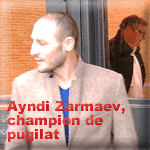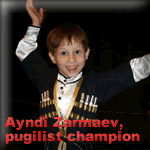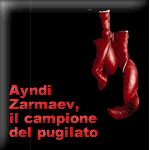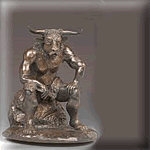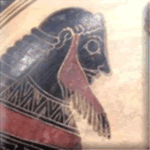| Organe de presse | ||||
| HOME | ||||
| Change
language |
| Droit Fondamental | |||||
Ayndi Zarmaev, the pugilist champion
Jacqueline de Croÿ - 14 juin 2009
The Chechen exploits are at the image of the Greek mythology, as when Khamzat projected himself to take in his leg the bullet that was aiming to pierce the heart of Alikhan, or when Ayndi Zarmaev, the brother of the famous commander, has floored a Minotaur.
Ayndi only showed me the pictures of a competition with an athlete half bull; half man, twice his size, trying to crush him under monstrous muscles, only when I told him about the pugilist fights of his ancestors. He said, without lifting an eyebrow, that the sports' club had chosen him by surprise an opponent weighing 70 pounds heavier than the maximum for his weight class. The boxing championship that assured the equality of the chances, ended-up with a pugilist bout, where only the strongest wins.
Pugilism was banned sixteen centauries ago, at a time when a last minute change of rules would not have been possible. It's shocking, because it requires from the athlete to take fast decision for a type of competition in which he is unprepared. The boss of the club, under the old laws, would have been whipped for his lack of fair play and the Minotaur would have been led to a labyrinth from which he would never find the way out, according to mythology. Our Chechen champion had no obligation to accept that. He wanted to keep his promise of participating the championship and he floored the Minotaur: Ayndi Zarmaev is the first pugilist champion in an official bout since 393 after Christ!
The Chechens are unfamiliar with their history, because the Russians forced them to defend their wives and children for half a millennium. They are originally Greek citizens from Gargar, according to Pompey and Strabo who could not have been mistaken by their own cousins. Citizenship was indeed only given to the sons born of a father and a mother of citizens, thus among cousins, which was the case of the Greeks and the Romans in those days. The original democracy was thus just a large family council.
The Chechen line comes from the twelfth century BC, at the time when Zeus became the god of the gods for 65 women, who gave him 117 children, all more handsome and stronger one than the other. We talk of mythology, but when we see their descendents, we are flabbergasted to see so many men strong and handsome as Greek gods. There is thus a good part of truth in mythological stories and we discover it with the Chechens.
Gargar is on the same Mount Ida in the present Turkey, where the Greek gods watched the Trojan War, 33 centauries ago, presumably with the ancestors of Ayndi. They had then attended a pugilist bout, whose champions became the favourites of the gods forever after, according to Homer. They deserve this favouritism. It is a staggering spectacle.
Pythagoras has also been a pugilist champion. He descends of Poseidon by Ancaeus and was referring to the "insiders of Mount Ida���, thus to the ancestors of Ayndi. They where banned under Persian dominance, because they were shadowing the only god taught by Zarathustra. Then, the Roman emperor Theodosia I banned the Olympics and all the other games made in the honour of their ancestors in 394, this time because they where shadowing Jesus Christ. Sixteen centauries later, we still have a better knowledge of the exploits of the Greek champions than of the miracles of our saints. Pugilism went underground and only came back in the nineteenth centaury, under the form of boxing, to ensure the equality of the chances, until the day Ayndi has floored the Minotaur.
It is hard not to make links between the history of the Greeks and of the Chechens , because they share the same cult of sports and the same passion of boxing. For example, Chechens are still recognised as the best infantry in the world and their schooling is still made in gymnastics for sport and not for war, like in ancient Greece. The training was initially designed to participate to the games dedicated to the ancestors, then to perform their duty as citizen of defending the city in case of war. They became unbeatable because they are athletes who are fighting for the love of their parents, their wives and their children against ordinary soldiers, shrimps whose job is to kill indiscriminately, no more.
Chechen men are the champions of the women, they treat as goddesses. They train, they fight and they win for those they love. There are thus no "submitted women", unlike the nonsense with which false experts are trying to knock us out, but little goddesses so righteous and full of wisdom that there is no way to find an argument to contradict them. The only thing that does not match with the mythology is the Chechen modesty. They find so normal to be strong that Khedi admires Ayndi's talent as a cook and says he is a boxing champion, but does not talk about his bout with a Minotaur. They minimise everything, in such a way that we are constantly surprised.
Feminists decry the lack of political rights until the last century, and they whine about the plight of Chechen women, obviously without having ever met any. The truth is that they are proud of their champions, who do not hesitate to defend their ideas, which has become unconceivable for us. The truth is that our Western machos have stolen the rights we had in antiquity, because they have become too lazy to become champions. This is fault of women because they have tolerated that men decorate themselves of medals without merit, what a Chechen woman would never tolerate.
As a result, we only have apes and monkeys left to govern our countries, where the respect is granted only to those who are stealing the most money without ending up in prison. Now, they are depriving us of our Chechen Olympic medals in the framework of a policy aiming at criminalizing our Chechen champions, which EU claims to "integrate" in order to pay their petrol to the Russians.
Nobody will have our Chechens. They will conquer their Chechnya back, including the petrol that will at last give them the means to rebuild the grandest cultural power the in world. They will have the best Olympic stadiums, with the most advanced schools, the most beautiful museums and they will employ the best scientists to do good, not evil, as the Russians now do with their oil money.
